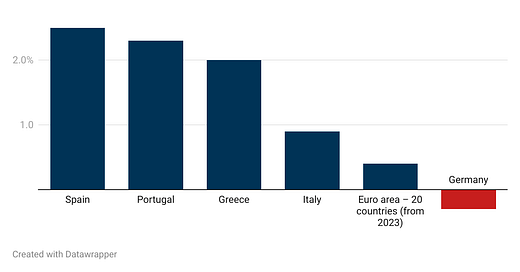The Mediterraneans are back in the game
If I was telling you 10 years ago that the southern economies of Europe (Greece, Spain, Italy and Portugal) will outperform the economy of Germany, you probably would be thinking that I am joking. And for me personally as an economic immigrant from Greece, one of the economies on the brink of collapse 10 years ago, still doesn’t sound real.
Despite what perceptions were 10 years ago, the southern economies have experienced a rise in their economic growth, supporting the Eurozone economy, while Germany is facing a period of stagnation. During 2023 the Spanish economy grew by 2.5%, the Portuguese by 2.3% and the Greek by 2.0% keeping the Eurozone average in positive economic growth. On the other hand the German economy contracted by 0.8%.
But why do the southern economies outperform Germany at the moment? Since the end of the lockdown during the COVID-19 pandemic, the southern economies have performed very strongly, with one of the main reasons being the increase in the tourism industry. When the borders opened again, the South of Europe was one the most loved destinations for Northern Europeans and other nations. And why it shouldn't be, especially if you have spent a year locked at home you would love to be somewhere sunny. That in combination with the increased savings from the households during that period supported a new flow of cash for the Southern economies. For example, the share of travel and tourism contribution to the Greek economy was 18.5% in 2022, compared with only 8.8% the same year in Germany.
Tourism is not the only reason though that we see the southern economies performing better. The Russian invasion in the Ukraine had an economic consequence for the Central European economies that heavily relied on Russian oil and gas. According to LSE Germany is one of the countries that have most heavily relied on Russian oil. The country has not been able to diversify its energy imports in the past and is still adjusting to the new reality that needs to reduce the dependency on Russian oil and gas. On the other hand, Portugal and Spain were economies that relied less on Russian oil and gas imports and as a consequence have been less affected from the war.
Source:LSE
In addition to that, the Northern European economies have lost their labour competitiveness. Austria, Belgium and France had to increase wages as a result of the higher inflation triggered by the COVID-19 pandemic and the Russian invasion of Ukraine. While the same happened in Italy, Spain and Greece, they increased their labour competitiveness because of structural changes and increased immigration in certain countries like Spain that improved labour productivity. Furthermore the EU’s €800bn recovery fund mainly supported the southern economies and as a consequence helped them to close the divide between the North and the South.
The issue is though that the Southern economic growth boost depends mainly on temporary factors, such as the rise of tourism. The high inflation we experienced the last couple of years and the higher housing costs will limit the ability of households to go on holidays, which may in future weaken the southern European economies. In combination with a continued weak economy in Germany, may have negative consequences for the Eurozone.
Germany holds the key for the eurozone economic recovery again, but this time needs to modernize its own economy by supporting new industries, while at the same time the Mediterraneans need to keep the efforts on improving public sector efficiency and support innovation. We need to build on the economic growth that the southern economies achieved after years of hardship, not only for the good of the national economies but as the cornerstone for a more sustainable Eurozone.




